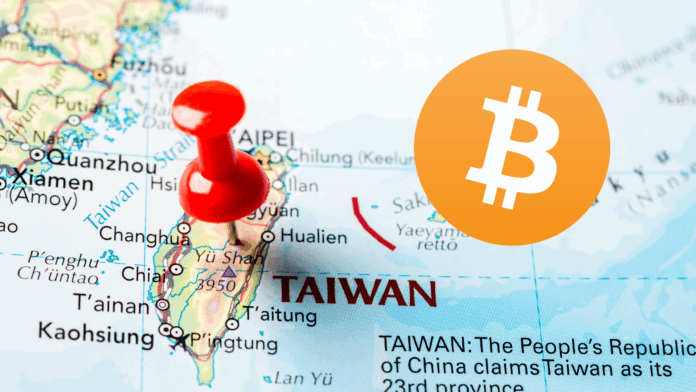In a bold move that signals growing institutional interest in cryptocurrency, Taiwanese lawmaker Ko Ju-Chun has formally proposed adding Bitcoin to the country’s national reserves as a hedge against global economic uncertainty and regional geopolitical risks.
JUST IN: ?? Taiwan Legislator Ko Ju-Chun advocates for #Bitcoin as a strategic reserve.
Asia is getting prepared ?
pic.twitter.com/QEURHo42Hz— Bitcoin Magazine (@BitcoinMagazine) May 9, 2025
Strategic Diversification Proposal
Speaking at Taiwan’s National Conference on May 9, Ko advocated for Bitcoin to be recognized alongside the country’s existing gold and foreign exchange reserves to enhance financial resilience. The legislator highlighted Bitcoin’s potential to serve as a hedge amid global economic risks and urged Taiwan to recognize the cryptocurrency alongside gold and foreign exchange reserves to boost its financial resilience.
Ko emphasized that Taiwan is an export-driven economy that has experienced significant fluctuations in its national currency, the New Taiwan dollar, amid global inflation and intensifying geopolitical risks. This economic vulnerability forms the core of his argument for diversifying the nation’s reserves.
Current Reserve Structure
“We currently have a gold reserve of 423 metric tons, and our foreign exchange reserves amount to $577 billion, including investments in US Treasury bonds,” the lawmaker stated during his presentation.
Ko expressed concern that in scenarios involving intense currency volatility or potential regional conflicts, Taiwan might “very likely be unable to ensure the security and liquidity” of its traditional reserve assets.
Also Read: Coinbase to Acquire Crypto Exchange Deribit for $2.9 Billion in Major Derivatives Play
Bitcoin’s Strategic Advantages
The legislator outlined several key attributes that make Bitcoin an attractive addition to national reserves:
“Bitcoin has been operating for over 15 years. It has a fixed total supply, is decentralized, and is resistant to censorship. Many countries are focusing on its hedging attributes. At the same time, in intense situations, it may not face the risk of embargo,” he said.
Ko also referenced the country’s vulnerability in a potential crisis scenario, suggesting that Bitcoin could serve as an uncorrelated asset that maintains liquidity and avoids seizure risk during geopolitical tensions.
Modest Allocation Proposed
Rather than suggesting a wholesale shift to cryptocurrency reserves, Ko has recommended a measured approach. Instead, the legislator suggested adding a “small proportion of Bitcoin” into the diversified assets as tools for sovereign asset allocation and risk hedging, and backup capacity of Taiwan’s financial system.
He previously indicated on X that Taiwan could allocate up to 5% of its reserves—about $50 billion—to Bitcoin, though he framed this as part of a diversified approach rather than a full pivot.
Taiwan ?? could follow suit! We could allocate a maximum of 5% of our $USD 50 billion reserve to $BTC. https://t.co/HmOTkf9gqy
— 科技立委葛如鈞 Ko Ju-Chun (@dAAAb) May 7, 2025
Also Read: New Hampshire Makes History as First US State to Enact Strategic Bitcoin Reserve Law
Digital Era Strategic Thinking
Ko framed his proposal in strategic terms that extended beyond mere financial diversification. “As former Dean Chen Chong said, Bitcoin is the gun of the digital era. It may also be the gold of the digital era, the silver of the digital era. Or it could be gunpowder. A wise nation will not let weapons be in others’ hands.“
“When exchange rate risk and regional uncertainty increase, it is time to introduce new tools to construct a more flexible financial strategy framework,” Ko added.
Taiwan’s Emerging Crypto-Friendly Stance
Ko’s proposal comes at a time when Taiwan appears to be warming to cryptocurrency integration. The news comes as Taiwan is emerging as a crypto-friendly jurisdiction, with the Financial Supervisory Commission pushing institutional trials of crypto custody services in late 2024.
Taiwan’s Financial Supervisory Commission released a draft of the “Virtual Asset Service Act” on March 25 to regulate crypto businesses and protect investors. The draft included licensing requirements for Virtual Asset Service Providers (VASPs), standards for stablecoin issuance by banks, and enforcement measures. A public consultation period followed, with legislation expected to advance by mid-2025.
This regulatory development contrasts sharply with mainland China’s approach, which continues to maintain its hostile stance on cryptocurrency after imposing a ban on multiple crypto activities, including mining, in 2021.
Global Context
Ko’s advocacy positions Taiwan among a small but growing number of jurisdictions exploring Bitcoin as a strategic reserve asset. While El Salvador became the first country to adopt Bitcoin as legal tender in 2021, others including El Salvador have added the cryptocurrency to their national reserves.
The lawmaker’s recent discussions with Jan3 CEO Samson Mow, who has advocated for Bitcoin adoption by states like El Salvador, suggest the proposal may be gaining traction among key stakeholders.
As Taiwan considers this proposal, it joins the global conversation about cryptocurrency’s role in national economic strategy—particularly for export-dependent economies seeking to hedge against currency volatility and geopolitical uncertainty.
Want real-time updates on Bitcoin, Ethereum, and blockchain trends? Crypto News Today delivers breaking crypto news, expert insights, and price movements to keep you informed.




